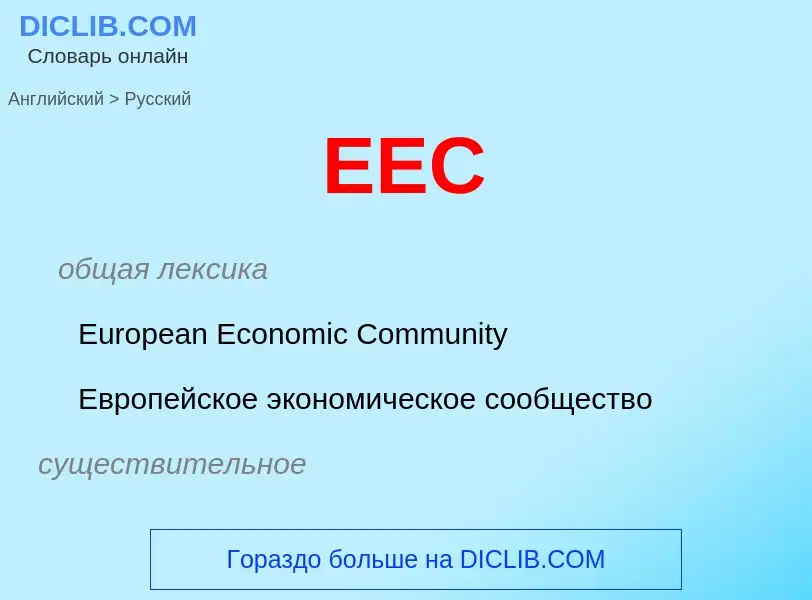Übersetzung und Analyse von Wörtern durch künstliche Intelligenz ChatGPT
Auf dieser Seite erhalten Sie eine detaillierte Analyse eines Wortes oder einer Phrase mithilfe der besten heute verfügbaren Technologie der künstlichen Intelligenz:
- wie das Wort verwendet wird
- Häufigkeit der Nutzung
- es wird häufiger in mündlicher oder schriftlicher Rede verwendet
- Wortübersetzungsoptionen
- Anwendungsbeispiele (mehrere Phrasen mit Übersetzung)
- Etymologie
EEC - Übersetzung nach russisch
общая лексика
European Economic Community
Европейское экономическое сообщество
существительное
общая лексика
Европейское экономическое сообщество (Общий рынок)
синоним
[ju(ə)rəpiənekənɔmikkə'mju:niti]
общая лексика
Европейское экономическое сообщество
Definition
Wikipedia
The European Economic Community (EEC) was a regional organisation created by the Treaty of Rome of 1957, aiming to foster economic integration among its member states. It was subsequently renamed the European Community (EC) upon becoming integrated into the first pillar of the newly formed European Union in 1993. In the popular language, however, the singular European Community was sometimes inaccurately used in the wider sense of the plural European Communities, in spite of the latter designation covering all the three constituent entities of the first pillar.
In 2009, the EC formally ceased to exist and its institutions were directly absorbed by the EU. This made the Union the formal successor institution of the Community.
The Community's initial aim was to bring about economic integration, including a common market and customs union, among its six founding members: Belgium, France, Italy, Luxembourg, the Netherlands and West Germany. It gained a common set of institutions along with the European Coal and Steel Community (ECSC) and the European Atomic Energy Community (EURATOM) as one of the European Communities under the 1965 Merger Treaty (Treaty of Brussels). In 1993 a complete single market was achieved, known as the internal market, which allowed for the free movement of goods, capital, services, and people within the EEC. In 1994 the internal market was formalised by the EEA agreement. This agreement also extended the internal market to include most of the member states of the European Free Trade Association, forming the European Economic Area, which encompasses 15 countries.
Upon the entry into force of the Maastricht Treaty in 1993, the EEC was renamed the European Community to reflect that it covered a wider range than economic policy. This was also when the three European Communities, including the EC, were collectively made to constitute the first of the three pillars of the European Union, which the treaty also founded. The EC existed in this form until it was abolished by the 2009 Treaty of Lisbon, which incorporated the EC's institutions into the EU's wider framework and provided that the EU would "replace and succeed the European Community".
The EEC was also known as the European Common Market in the English-speaking countries and sometimes referred to as the European Community even before it was officially renamed as such in 1993.

![The [[European Parliament]] held its first elections in 1979, slowly gaining more influence over Community decision making. The [[European Parliament]] held its first elections in 1979, slowly gaining more influence over Community decision making.](https://commons.wikimedia.org/wiki/Special:FilePath/Bundesarchiv B 145 Bild-F023908-0002, Straßburg, Tagung des Europarates.jpg?width=200)
![President]] [[Jacques Delors]], the last EEC Commission President President]] [[Jacques Delors]], the last EEC Commission President](https://commons.wikimedia.org/wiki/Special:FilePath/Bundesarchiv B 145 Bild-F078267-0023, Bonn, Ministerpräsidenten mit EU-Kommissar Delors-CROPPED.jpg?width=200)
![[[French President]] [[Charles de Gaulle]] vetoed British membership, held back the development of Parliament's powers and was at the centre of the 'empty chair crisis' of 1965. [[French President]] [[Charles de Gaulle]] vetoed British membership, held back the development of Parliament's powers and was at the centre of the 'empty chair crisis' of 1965.](https://commons.wikimedia.org/wiki/Special:FilePath/De Gaulle-OWI.jpg?width=200)


